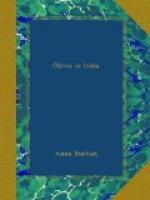When Boggley finished I was silent, remembering the little chintz-covered chair—empty but for a broken doll.
Now that I have tasted the joys of solitude I don’t see how I am to enjoy living in a crowd again. I am practically alone all day, for Boggley has long distances to ride and bicycle—and I never was so happy in my life, I write, and I read, and I fold my hands in newly acquired Oriental calm (which my bustling, busy little mother most certainly won’t admire), and sit looking before me for hours.
The books lent me by various people are all read long ago, and I have gone back to those that are always with me.
They are all before me as I write. The little fat green one at the end of the row is Lamb’s Essays of Elia: he so well fits some moods, and certain minutes of the day, that gentle writer. Next is my Pilgrim’s Progress, the one I have had since my tenth birthday. Father gave each of us a copy when we reached the mature age of ten. It was only on high days and holy-days that we were allowed to look at his own treasured copy, which stayed behind glass doors in the corner book-case. The illustrations, I know now, were very fine, and even then we found them wonderful. Then comes my little old Bible. I coveted it for years before I got it because it had pages like five-pound notes; I value it now for other reasons. Next the Bible is Q’s Anthology of English Verse, its brave leather cover rather impaired by the fact that for two mornings Boggley, having mislaid his strop, has stropped his razor on it. Lastly comes my Shakespeare.
Sometimes in a night-marish moment I wonder what the world would have been like had there been no Shakespeare. Suppose we had never known Falstaff, never heard the Clown sing “O Mistress Mine,” never laughed with Beatrice nor masqueraded with Rosalind, never thrilled when Cleopatra “again for Cydnos to meet Mark Antony” cries “Give me my robe, put on my crown; I have immortal longings in me.”
What would we do when surfeited with the company of those around us if we couldn’t creep away and pass for a little while into the company of those immortals? What does it matter how tiresome and complacent people are when I am Orsino inviting the Clown to sing words the utter beauty of which bring the tears to my eyes:
“O fellow, come, the song we had
last night:
Mark it, Cesario; it is old and plain:
The spinsters and the knitters in the
sun,
And the free maids that weave their thread
with bones,
Do use to chant it; it is silly sooth,
And dallies with the innocence of love,
Like the old age.”
One never comes to the end of the beauty. Only to-day, while I was browsing for a few minutes in a comedy I have not much acquaintance with, I happened on these lines, which I am going to write down merely for the pleasure of writing them:
“I am a woodland fellow, sir, that always loved a great fire, and the master I speak of ever keeps a good fire. I am for the house with the narrow gate, which I take to be too little for pomp to enter: some that humble themselves may, but the many will be too chill and tender, and they’ll be for the flowery way that leads to the broad gate and the great fire.”




